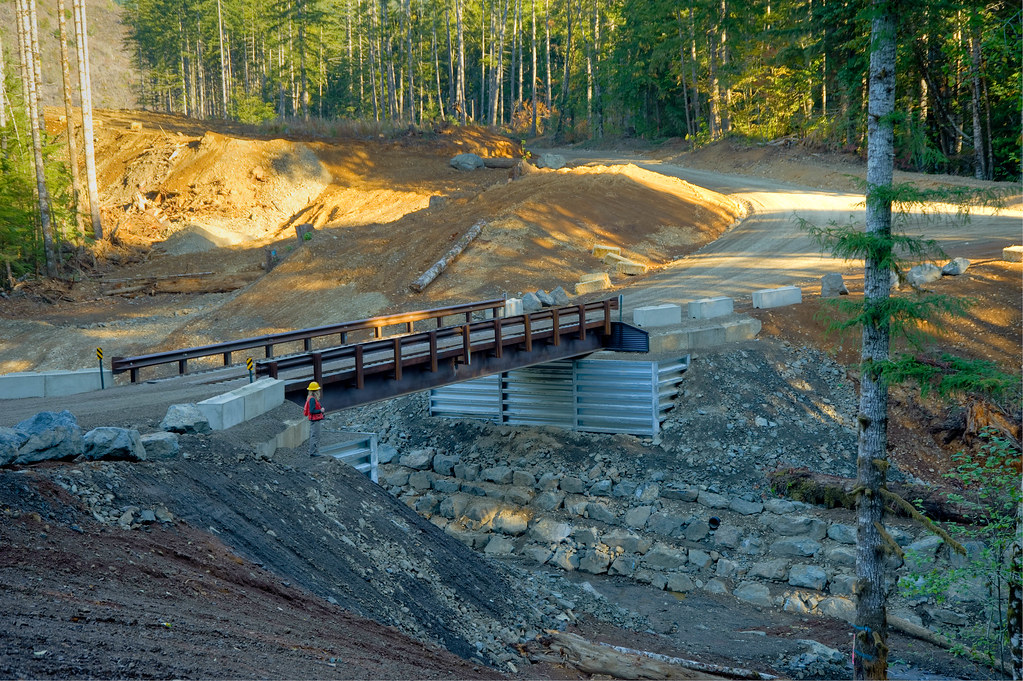
A road in a floodplain within the Okanogan-Wenatchee National Forest in north-central Washington. It was later decommissioned. Click through this slideshow for "before and after" images of roads that were rebuilt to keep sediment from polluting streams.
U.S. Forest Service
The U.S. Supreme Court Wednesday decided in favor of the timber industry in a case that challenged the regulation of muddy water that flows off logging roads. The case was originally filed in Oregon by an environmental group. It argued roads in state forests were violating the Clean Water Act.
Here’s a Q & A to sort out the case and what it means:
Q: What was at stake in this case?
A: There are hundreds of thousands of miles of logging roads in the Northwest and some of those roads send runoff into nearby streams.
Q: So what's the problem?
A: That fine sediment can smother fish eggs and cause problems for salmon. The federal Environmental Protection Agency has said that the Clean Water Act leaves this kind of stormwater pollution on timberland up to individual states to regulate.
The Northwest Environmental Law Center sued. It said that under the plain language of the Clean Water Act, logging road runoff is industrial pollution and the EPA has to regulate it.
Road Maintenance Cuts Mean More Sediment
Sixty years of heavy traffic by logging trucks, along with trips by forest managers and recreation-seekers have taken a toll on roads that run through Northwest forests.
Tens of thousands of miles of those roads are crumbling, sending sediment and other pollutants into rivers and streams. Fish don't like that...continue reading...
Q: A lower court had sided with the environmental groups, but the Supreme Court reversed that decision. Why?
A: The 9th Circuit Court of Appeals had ruled that the EPA's interpretation of the Clean Water Act was illogical. And it had found that runoff from logging roads fit the definition of industrial stormwater pollution.
Read: Supreme Court Rules Logging Roads Don't Violate Pollution Law
In a 7-to-1 decision the Supreme Court said that was wrong. The EPA had for 35 years interpreted the law not to apply to logging roads. And the court should defer to the EPA’s reading of its own rules.
Q: The Oregon Board of Forestry and the timber industry prevailed in this case. How did they react?
A: Unsurprisingly, they were pleased with the court's decision. Steve Zika is CEO of Hampton affiliates, a Northwest sawmill business named in the lawsuit. Here's what he had to say about the case when he talked to EarthFix/OPB reporter Amelia Templeton:
“To go out and get permits for every little section of road would have just made our business unmanageable.”
Zika and others in the industry say the water quality in Oregon’s forests is quite good. He urged environmental groups that have concerns to consider working through the Board of Forestry or other collaborative groups.
“These cases just go on forever, and we spend a lot of money paying lawyers. We wish people would really come and debate these issues and talk about these things, as opposed to just immediately going to the courts.”
Q: How did environmental groups react?
A: Environmental groups of course have said they are disappointed in the court's decision and will keep pressing the EPA to look at the logging roads issue.
Listen: A 2012 report on logging roads and the Clean Water Act:
Q: So one justice dissented in this case. Who was it?
A: It was Antonin Scalia, one of the most conservative Supreme Court justices. Scalia actually agreed with the environmental groups in this case and wrote a very forceful dissent. Enough is enough, he said. According to the Clean Water Act, forest road runoff that flows through a culvert is industrial pollution. And government agencies like the EPA should follow a plain reading of the law.
Q: What are court-watchers making of this odd-bedfellows situation?
A: Allison LaPlante, Clinical Law Professor at Lewis and Clark Law School, says it's very unusual for Scalia to side with an environmental group.
“On the one hand, it's pretty uncommon to see Justice Scalia aligned in any way, shape or form with the environmentalists. It's on some level, though, not surprising, because Justice Scalia is often known to advocate for a plain meaning approach to the law, which is the statute means what it says, the regulations mean what they say.”
Q: What did the other justices think of that argument?
A: Chief Justice John Roberts actually suggested he's sympathetic to it. There is a longstanding legal precedent behind this idea of the courts deferring to government agencies when it comes to interpreting this kind of regulation. And Roberts wrote that he'd like to see more cases that challenge that issue. Here's LaPlante again:
“Okay, the bar is now aware that there might be some interest in reconsidering this, so have at it, bring it on. It was to me clearly an invitation to litigants to bring this issue back before the court.”





